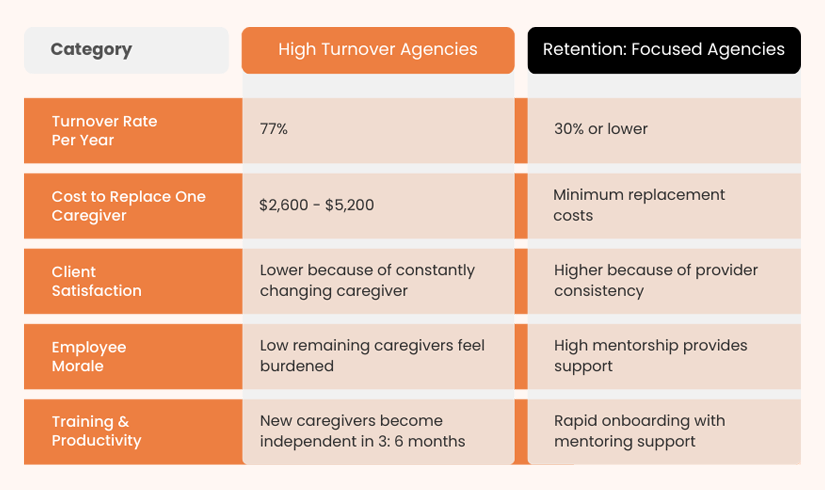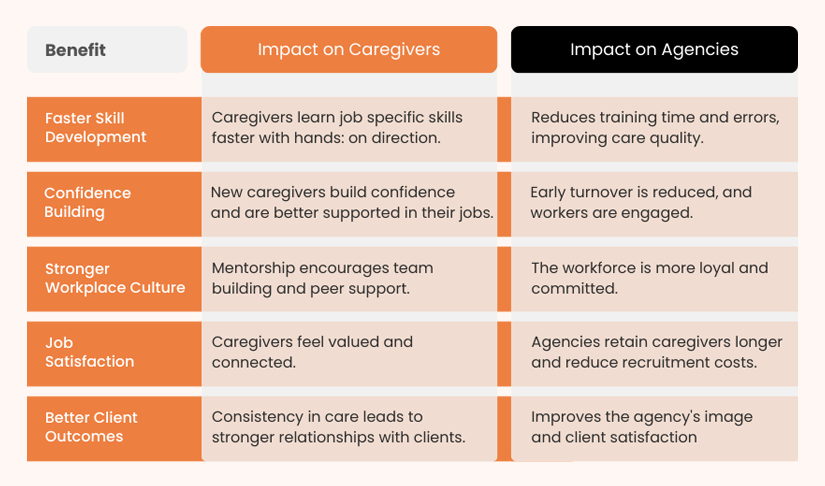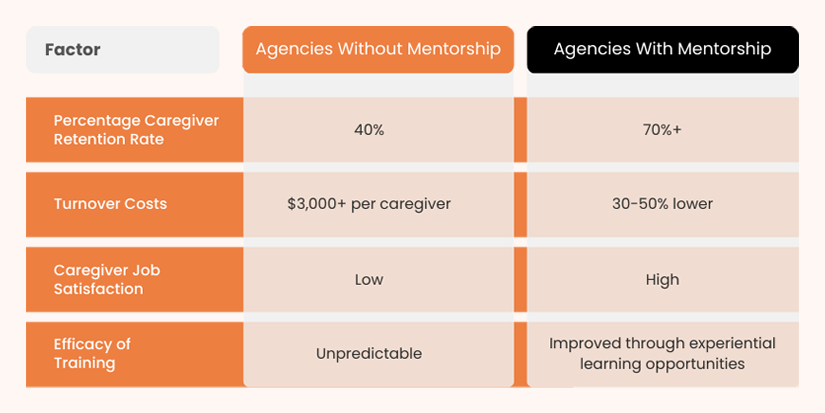
The caregiving industry has recently faced a few massive problems: high turnover rates, increasing demand, and growing skills gaps.
As a result, agencies are finding it challenging to build workforce stability. More importantly, this kind of continuous hiring and turnover creates ripples in patient care, increased recruitment costs, and burnout for existing staff.
However, one proven solution is caregiver mentoring programs. These programs pair new hires with experienced caregivers who can provide hands-on training, emotional support, and clear career growth opportunities. New caregivers gain much-needed confidence, reduce early job frustration, and enhance job satisfaction, leading to higher retention rates. So, if you want a functional, effective strategy to retain caregivers and strengthen your agency, look no further than a mentoring program.
Read on to learn how to implement an effective caregiver mentoring program and assure long-term workforce stability.
One of the most significant reasons agencies must invest in caregiver mentoring programs is the high cost of caregiver turnover.
This is inclusive of:
In addition to the cost, high turnover hurts patient care. When patients have new caregivers coming in all the time.
They suffer from:

Caregiver mentoring programs allow agencies to reduce turnover, save money, and improve satisfaction for caregivers and clients.
A caregiver mentoring program is a structured program whereby experienced caregivers, known as mentors, train and support new caregivers, referred to as mentees. Unlike typical caregiver training programs, which mainly focus on skill development through classroom or online training, mentorship provides learning experiences in real-life settings.
A successful caregiver mentoring program includes these elements:
A good read: Building Bridges: How Newcomers and Veteran Caregivers Create a Winning Team

Structured caregiving mentoring can easily increase the retention of caregivers by a wide percentage. Research shows:

A caregiver mentoring program can only be developed through meticulous planning, suitable participants, and a process. A well-planned program helps caregivers transition smoothly to their roles, improves job satisfaction, and enhances caregiver retention. Below is the step-by-step guide to developing a successful mentoring program for caregivers that guarantees long-term success.
Choosing suitable mentors is the foundation of a successful caregiver mentoring program. Not everyone with experience is a good mentor. Mentoring and guiding new caregivers requires unique qualities, including good communication, patience, leadership, and emotional intelligence.
What to Expect When Selecting a Mentor:
Mentor training should be offered so that professional caregivers know their roles and responsibilities. Several agencies provide small incentives to participate in the mentorship program, such as bonuses, overtime, time off, or public recognition.
Finding the right mentor and mentee is usually the key to success. An ill-fitting match leads to frustration, poor communication, and wasted time.
Best Practices in Matching Mentors and Mentees:
Additionally, mentee feedback shortly after the initial match will determine whether it is good or needs to be reworked. If a mentee feels uncomfortable with the assigned mentor, he should be offered an alternative game.
A formal caregiver mentoring program ensures the mentorship process is standardized, compelling, and objective-based. Agencies should outline well-defined objectives, timelines, and expectations for mentors and mentees.
Key Elements of a Structured Mentorship Program:
A well-designed program makes mentorship more than friendly conversation; it becomes a formal, efficient learning process that enhances training results and caregiver retention.
Even great caregivers need to be trained to mentor. It is one thing to be a great caregiver but another to be a great coach or instructor. So, this is a crucial step to ensure that the experienced caregiver can effectively mentor the less experienced caregivers.
Things to Discuss in Mentor Training:
Agencies can train mentors through workshops, online or one-on-one coaching. Once the mentors are trained, agencies can retain more caregivers by creating an open and participative learning environment for new employees.
After an agency implements a caregiver mentoring program, it must monitor it regularly and improve based on input from the mentors and mentees.
Measuring Success:
Therefore, a caregiver mentoring program guide is a must for ongoing improvement through real-world feedback to improve the effectiveness of caregiver training programs and their retention.
Best practices for caregiver mentoring help agencies create structured, effective programs that enhance engagement, improve training outcomes, and boost caregiver retention.
Caregiving is a challenging profession, and if not done properly, even dedicated caregivers can become overwhelmed and leave the field. A formal caregiver mentoring program fills the gap between training and actual caregiving, giving new employees the information, confidence, and emotional support they require to succeed.
Mentorship as a retention strategy enables agencies that experience high employee turnover to hold on to their employees. An agency investing in a caregiver mentorship program is an agency with the potential to be a better, trained, more committed, and loyal workforce, a sign of good things to come for improved patient care and long-term success.
To start constructing your caregiver mentoring program guide, start small, take feedback, and keep fine-tuning it throughout. Wonderful caregivers deserve excellent support.
What is the difference between caregiver mentorship and caregiver supervision?
While supervision focuses on oversight and compliance with job tasks, mentorship is a supportive relationship that encourages personal and professional growth. A mentor offers advice, emotional support, and guidance beyond job checklists.
Can mentorship programs be virtual for caregivers working in remote or rural areas?
Yes. With the growing need for flexibility, mentorship can be delivered through video calls, chat support, and scheduled check-ins. This makes it accessible for caregivers in underserved areas and helps agencies scale mentorship programs efficiently.
What are the 3 C’s of a strong caregiver mentoring relationship?
Is mentorship only useful for new caregivers, or can experienced staff benefit too?
Experienced caregivers can also benefit by becoming mentors themselves—enhancing leadership skills, gaining recognition, and contributing to a positive workplace culture. Peer mentorship among experienced staff can also support burnout prevention and skill cross-training.
How can mentorship programs promote diversity and inclusion in caregiving?
By pairing mentors and mentees across cultures, languages, and caregiving specializations, mentorship programs can foster empathy, cultural competence, and a more inclusive workplace—ultimately improving care for diverse client populations.
Related Blogs:
Cut Costs, Not Quality: The Ultimate Guide to Saving with Learn2Care
Shaping the Future of Caregiving: Key Trends and Innovations
Contact us to inquire about our state-wise training courses and take the first step towards upskilling your team with a 14-day free trial!